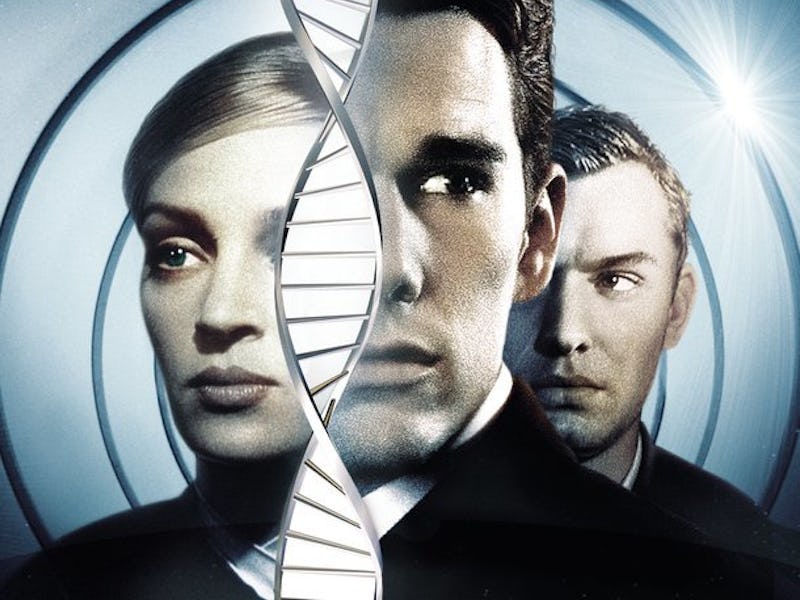Re-Watching 'Gattaca' at the Dawn of the Age of CRISPR and Genetic Editing
Now that its predictions are becoming true, Andrew Niccol's 1997 gene-engineered dystopia is especially uncomfortable.

When Andrew Niccol’s Gattaca premiered in 1997, the chances that society could adopt a genome-driven New World Order were still slim enough that audiences could enjoy his dystopian fantasy for what it was: a damn fine work of science fiction. But, in the eighteen years since the film’s release, the gene engineering tools — and their implications — that Niccol imagined have become reality or near-reality. In the golden age of genetic engineering, questions about “designer” babies begin with “when,” not “if.” The film is almost painfully uncomfortable to watch now because the scenario it posits is scientifically conceivable, albeit socially untenable and unlikely.
The real reason we’re scared of genetic engineering, as Gattaca attests, has more to do with our shortcomings than with the pursuit of perfection. In the age of CRISPR, when myopia can theoretically be edited out of a genome and Jude Law’s fair skin and blue eyes engineered in, genetic introspection can be a tough process. At the beginning of Gattaca, the camera pans over a couple in a car banging out offspring the old-fashioned way. Ethan Hawke’s “de-gene-erate” narrator wistfully recalls the old standards for perfection, upheld in the time before sex for procreation was considered quaint. “Ten fingers, ten toes, that’s all that used to matter,” he says. “But not now.”
Because he doesn’t come from genetically engineered stock — and therefore carries a higher risk of disease than the average “Valid” Joe — Hawke’s Vincent, later Jerome, is considered chronically ill. To inherit a genome the natural way, from normal, unengineered parents, is to be born sick. We are all, under this definition, diseased. It doesn’t matter much now because, at the moment, we’re all more or less equally disadvantaged. But if genetically engineering embryos to eradicate diseases becomes the norm, a new standard for perfection will inevitably arise. A few generations from now, knowing that your kid didn’t make the swim team because her classmates had artificially modified genomes will evoke an unprecedented sense of unfairness that, like Jerome, we’ll struggle to come to terms with.
It’ll be a while before full-on genomic engineering in humans becomes a thing, but that doesn’t mean it remains in the offing. In April, Chinese researchers reported using CRISPR to edit the germlines of human embryos to eradicate the blood disease betathassalemia. When you edit genes at that level, any changes will be passed on to offspring, irrevocably shifting the course of human evolution. There was more of an uproar about this particular study than there needed to be — these embryos were never going to develop into actual humans — but it was important because of its Gattaca-level implications. So what if there’s a long way to go before we can edit iron deficiency out of our genomes? The important takeaway is that we’re already trying.
We can take solace in the fact that scientists, maybe thanks to movies like Niccol’s, have been trained to be especially wary of the implications of their work. One of the top scientists in the CRISPR game, UC Berkeley’s Jennifer Doudna, called for a moratorium on human germline modification in Science earlier this year. In a recent interview with The New Yorker, she admitted to nightmares where eugenics-obsessed Adolf Hitler wanted in on CRISPR, too. Gattaca doesn’t propose we’ll necessarily use genetic engineering to do evil directly, but it does predict — correctly so — that we’ll use it to improve the human race.
Evil stems from people, not tools. Immorality, if we ever let it become an issue, will ultimately stem from how we deal with the genetic haves and have-nots.
Had Niccol made the movie now, he might have imagined a less bleak future for Eugene, Jude Law’s genetically flawless cripple. Gene therapy will soon become one of CRISPR’s more immediate applications — Editas already plans to use it to correct a form of blindness — and using it to help reverse the effects of paralysis on human muscle can’t be that far off. Now that we’ve figured out how to 3D print cells and tissues in the first place, Eugene probably wouldn’t have had to stick around to provide bags of personal fluids. The scientific progress shown in Gattaca turns out to be uneven.
Still, his sad end — and Jerome’s eventual triumph — are reminders of what could happen if society ends up putting too much stock in genetics and not enough in human potential. That would be an amateur mistake: Any high school science student could tell you that biology’s basic equation is Phenotype = Genotype x Environment. That is, the fate of humankind isn’t written entirely in genetic code. There’s a lot to be said for our interactions with the world and people around us.
One of the hallmarks of good sci-fi is that it makes people uncomfortable. Gattaca did that almost two decades ago, but it evoked a manageable kind of discomfort, the one that audiences could divorce themselves from as soon as they stepped out of the theater. The problem with rewatching it now is that you can’t put aside your anxieties once the credits roll. We’re all Vincent — for now.